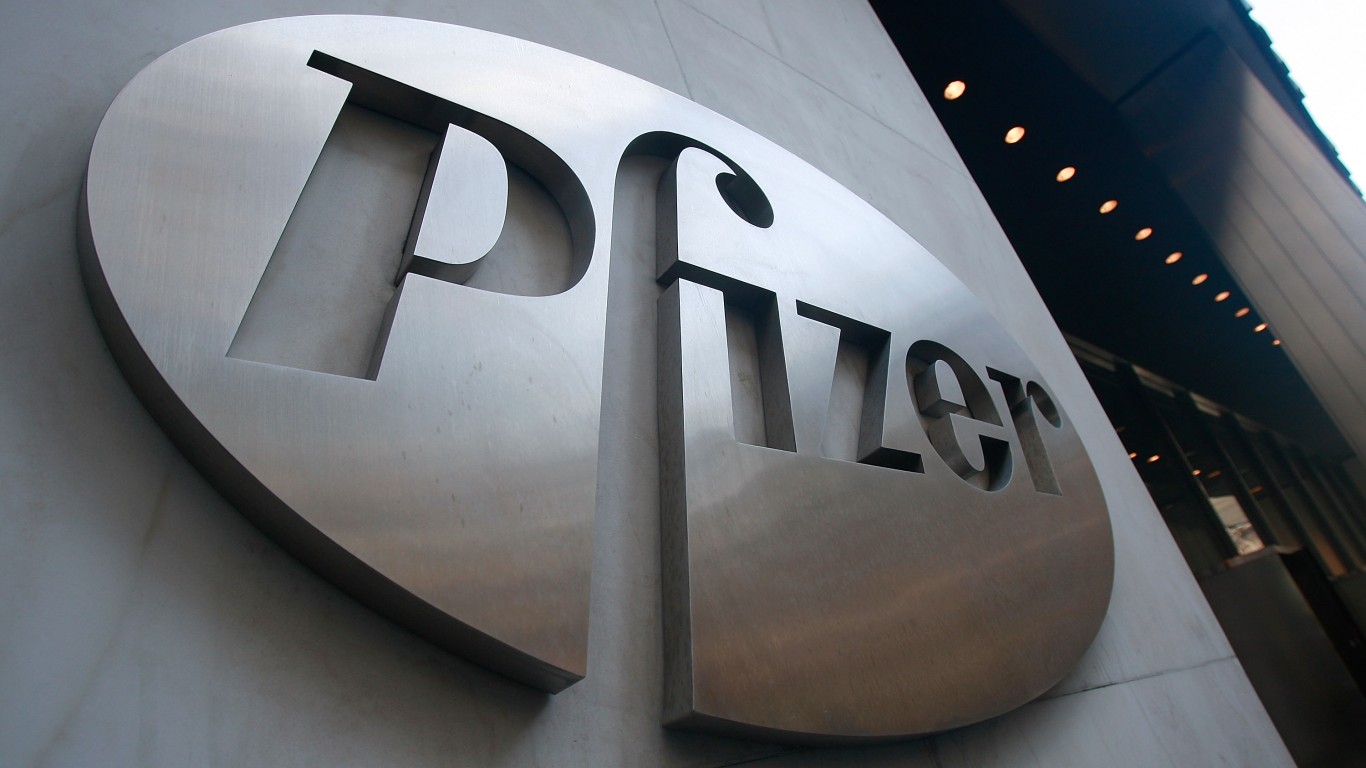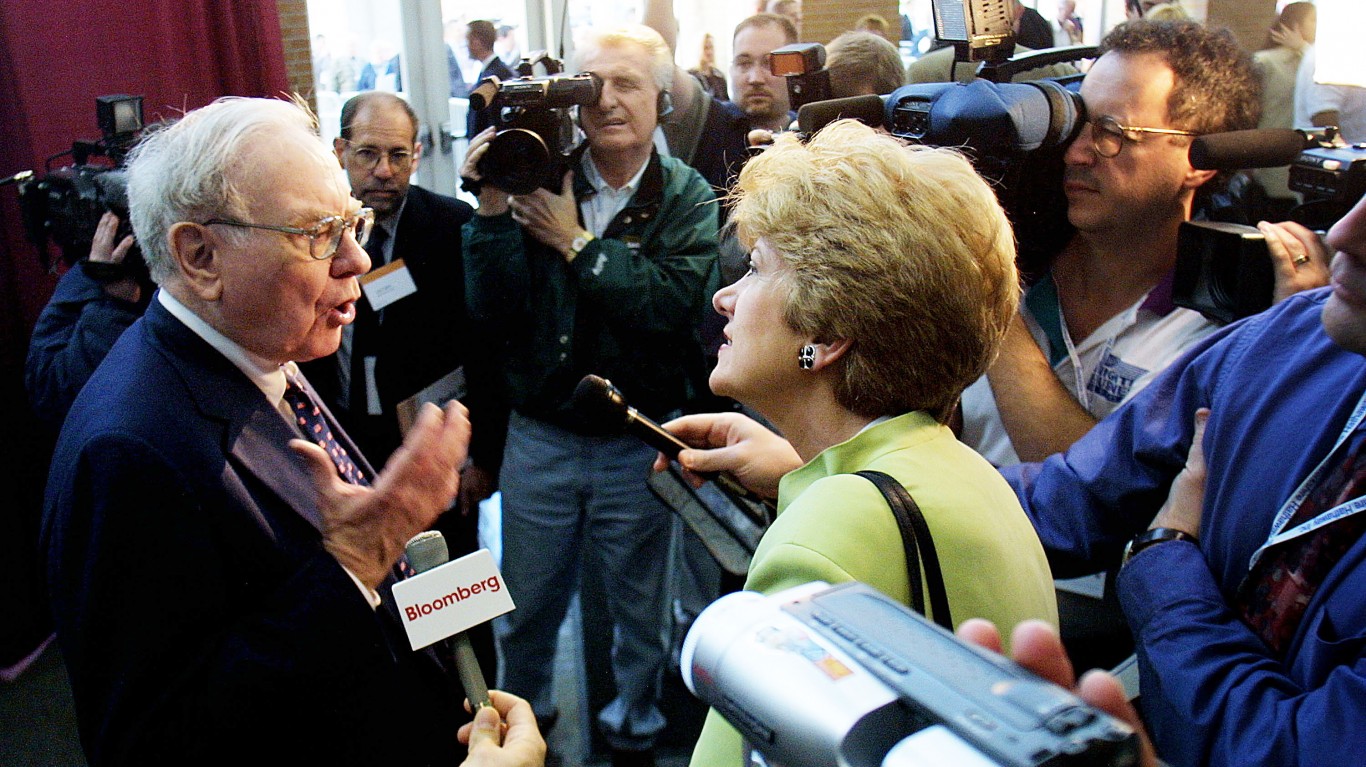
It takes a certain kind of courage to short sell blue chips, such as the Dow Jones industrial average components. Short sellers are betting on these companies to fail, or at least for their share prices to fall handily. Plus, those sellers are responsible for paying the dividends on the stocks they short.
Maybe it is little wonder that only three of the 30 Dow stocks had notable short interest lately; that is, more than 50 million shares short. In fact, five of them had short interest of more than 40 million shares.
Yet the bull market is quite long in the tooth — now more than 10 years old — and concern about a coming recession is rising. Investors may wonder then what the short sellers expect from some of the biggest, most well-respected names on Wall Street.
As of the March 29 settlement date, the most recently reported period, short sellers still favored Pfizer Inc. (NYSE: PFE), Apple Inc. (NASDAQ: AAPL) and Intel Corp. (NASDAQ: INTC) above all other Dow stocks.
Pfizer
> Shares short: 79.89 million
> Change from prior period: −22.80%
> Percentage of float: 1.4
This is the third double-digit percentage decline in a row, as short interest retreats following the almost 265% rise in early January to the greatest number of shares short at Pfizer so far this year. Another sharp drop could allow Apple to reclaim the top spot on this list. At the daily average volume on the most recent settlement date, it would take about four days for Pfizer short sellers to cover their positions.
Pfizer stock has been lagging rival Merck but that may be about to change. By the end of the latter two weeks of March, the share price had inched up a little more than 1%, which was more or less in line with Dow during that time. The stock continued that trend afterward.
The stock closed Tuesday’s trading at $42.84 a share, about the same as it was a week ago. Pfizer’s 52-week low of $34.37 was seen last spring, and the 52-week high of $46.47 was from this past December. Shares are down almost 2% year to date.
Apple
> Shares short: 67.79 million
> Change from prior period: −6.8%
> Percentage of float: 1.4
Note that this was down from a year-to-date high of almost 97 million Apple shares short more at the end of February and that the average daily trading volume has been on the rise since that time. By the end of last month, the number of days it would take for investors to cover all their short positions had dwindled to about two.
The iPhone maker recently ramped up diversification of its offerings, a move that comes with potential rewards and risks. Short sellers watched the share price rise almost 6% but then end on the most recent settlement date with a gain of only about 2%. The Nasdaq saw a gain of even less than that during those two weeks.
After gaining almost 3% in the past week, Apple stock ended trading most recently at $199.50 a share. That was in a 52-week range of $142.00 (at the beginning of this year) to $233.47 (last October). The share price currently is more than 26% higher than at the beginning of this year.
Intel
> Shares short: 53.90 million
> Change from prior period: −5.6%
> Percentage of float: 1.2
This reclaimed a similar gain in the previous period but now is the lowest short interest since last October. Note that the average daily trading volume fell to a 52-week low and, as of the end of last month, it would take almost three days for investors to cover all their short positions.
Some analysts see old-school tech stocks like Intel as the way to play the sector now. The March 29 closing share price was more than 1% lower than on the previous settlement date, though it was down more than 3% earlier in the period. The S&P 500 saw a marginal gain in the latter half of the month.
Intel was last seen trading at $55.32 a share, down modestly from the multiyear high of $57.60 hit last June. The 52-week low is $42.36 per share. And the latest share price is more than 17% higher than at the beginning of the year, which is less than the Nasdaq but better than the Dow.
And the Rest
Rounding out the top five most shorted Dow stocks again on the most recent settlement date were Microsoft Corp. (NASDAQ: MSFT) and Cisco Systems Inc. (NASDAQ: CSCO). While the former bucked the overall trend with a modest gain in the number of its shares short, both of these stocks saw a marginal increase in their share price during the short interest period.
Also notice on the full list of the Dow stocks ranked by number of shares short as of March 29 that while the overall trend was for short sellers to shy away from these stocks, Walt Disney Co. (NYSE: DIS) led that charge, which allowed it to fall well down the list in those two weeks, and Verizon Communications Inc. (NYSE: VZ) bucked the trend:
| Dow Stock | Short (millions) | Change | % Float |
|---|---|---|---|
| Pfizer | 79.89 | −22.80% | 1.44% |
| Apple | 67.79 | −6.83% | 1.44% |
| Intel | 53.90 | −5.57% | 1.20% |
| Microsoft | 45.93 | 2.32% | 0.61% |
| Cisco | 42.22 | −4.56% | 0.96% |
| Exxon | 39.52 | −8.72% | 0.93% |
| Verizon | 38.66 | 20.12% | 0.9.4% |
| Merck | 32.63 | −15.65% | 1.27% |
| Visa | 30.05 | −2.86% | 1.72% |
| Coca-Cola | 24.51 | −16.47% | 0.58% |
| Walgreens | 23.50 | −7.53% | 2.96% |
| Procter & Gamble | 22.81 | −7.58% | 0.91% |
| DowDuPont | 22.33 | −4.28% | 0.99% |
| Chevron | 17.17 | −10.74% | 0.90% |
| Walmart | 16.52 | −17.93% | 1.18% |
| JPMorgan | 17.59 | −5.19% | 0.54% |
| IBM | 14.63 | −7.82% | 1.65% |
| Disney | 13.98 | −67.69% | 0.78% |
| Johnson & Johnson | 12.27 | −6.13% | 0.46% |
| Nike | 10.96 | 6.75% | 0.88% |
| 3M | 10.02 | 2.13% | 1.74% |
| Home Depot | 9.61 | 0.14% | 0.85% |
| United Technologies | 7.61 | 6.24% | 0.88% |
| American Express | 6.70 | −23.29% | 0.80% |
| UnitedHealth | 6.51 | 0.29% | 0.68% |
| Caterpillar | 6.26 | −18.61% | 1.09% |
| McDonald’s | 6.19 | −0.99% | 0.81% |
| Goldman Sachs | 5.44 | −13.71% | 1.59% |
| Boeing | 5.07 | 2.95% | 0.90% |
| Travelers | 3.86 | 5.18% | 1.47% |
Note: DowDuPont was replaced by Dow after the most recent short interest settlement date.
Thank you for reading! Have some feedback for us?
Contact the 24/7 Wall St. editorial team.

 24/7 Wall St.
24/7 Wall St.



